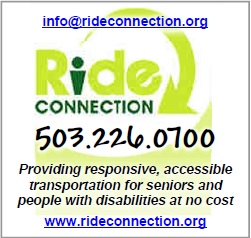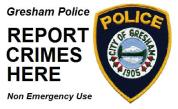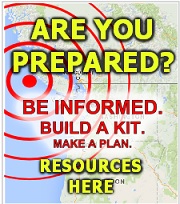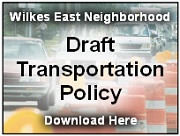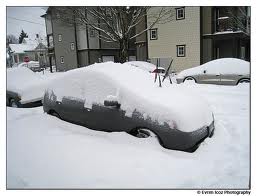 December 23, 2008, Portland OR |
Cold Temperatures, Snow, Freezing Rain and High Winds are Dangerous
What will you do without lights?
|
Winter is quickly approaching, so now is the perfect time to start thinking about winter storm preparation. Household emergency supplies should include enough food, water and supplies to last four days without power or help.
2010, Wet and wild winter predicted
A recent story in the Portland Tribune said Portland area residents are in for a wet and wild winter according to a series of forecasts presented by members of the Oregon chapter American Meteorological Society.
Two years ago an arctic blast delivered a series of three storms that began December 14, 2008 and kept a grip on the area for over two weeks. Portland reported six days where the temperature never got above freezing with high winds, blowing snow, and numerous road closures. Portland General Electric estimated 60,000 customers were without electricity on December 21st. And, on December 23, the airport reported a whopping 10" of snow in one day making it the snowiest December on record.
BRRRrrrr
The 2010 Farmers’ Almanac claims this winter will see more days of shivery conditions: a winter during which temperatures will average below normal for about three-quarters of the nation. Western Washington, Oregon, and northwest California should expect above-normal snowfall in most places. The coldest (and snowiest) periods will occur in mid-December and mid- to late February.
AccuWeather.com Chief Long-Range Meteorologist Joe Bastardi is predicting that the worst of winter's cold and snow will be from the Pacific Northwest to the western Great Lakes. "That will put cities like Portland and Seattle colder and snowier this year".
Winter Checklists and Wind Chill Chart below the break
They told us rain, but..
Last year rain was predicted for December 29th, but instead snow began to fall mid-day creating a nightmare evening commute. Oregon Dept of Transportation estimated as many as 1,000 vehicles were abandoned overnight on the interstates and street throughout the Portland metro area.
Don't let winter weather catch you by surprise. Make a plan. Be prepared.
Use these handy checklists to help you be ready.
Personal Checklist
- Food that doesn't require heating or refrigeration, such as canned meats, soups and stews, cereal, and energy bars
- Manual can opener
- Paper plates, cups and plastic utensils
- 1 gallon of water per person per day (allow enough for four days)
- Baby supplies (bottles, formula, food, diapers)
- Flashlights and batteries
- Battery-powered radio
- Battery-powered clock
- First-aid kit (printable first-aid kit checklist)
- Four-day supply of prescription medicines
- Extra cash on hand
- Warmcoats, gloves or mittens, hats, boots and extra blankets and warm clothing
- Dress in several layers of lightweight clothing, wear mittens and a hat that covers your ears
- Pet food and additional water for household pets
Vehicle Checklist
- Check antifreeze
- Check and replace older batteries
- Keep the gas tank near full to avoid freezing water in the fuel line
- Check tires and spare tire for proper inflation
- Bag of sand, road salt or non-clumping cat litter. The bag's extra weight means better traction, the contents can be spread under slipping tires.
- Ice scraper
- Jumper cables
- Small shovel (to dig snow away from wheels)
- Tire chains
- Flares or reflective triangle
- Blanket
- Flashlight and batteries
- Gallon jug of drinking water
- Nonperishable food
- First aid kit
Household Tips
- Remove outdoor hoses, cover faucets
- Bring pets / companion animals inside during winter weather
- Have ample alternate heating methods such as fireplace wood
- Never leave lit candles unattended
- Sand, rock salt or non-clumping kitty litter to make walkways and steps less slippery
- Running water indoors, even at a trickle, helps prevent pipes from freezing
- CAUTION: CARBON MONOXIDE KILLS!
Never use a generator, grill, camp stove, propane, natural gas or charcoal-burning devices inside a home, garage, basement, or any partially enclosed area.
Weather, Know the Difference
It's important to understand the difference between Sleet and Freezing Rain, and also the different types of Winter weather.
- Freezing Rain creates a coating of ice on roads and walkways
- Sleet is rain that turns to ice pellets before reaching the ground. Sleet also causes roads to freeze and become slippery
- Winter Weather Advisory means cold, ice and snow are expected
- Winter Storm Watch means severe weather such as heavy snow or ice is possible in the next day or two
- Winter Storm Warning means severe winter conditions have begun or will begin very soon
Wind Chill Chart
Wind chill is not the actual air temperature, but is based on the rate of heat loss from exposed skin by the combined effects of wind and cold. Use the chart below to calculate your wind chill temperature the next time a storm blows through.


